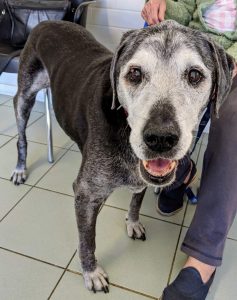Arthritis Treatments

When arthritis starts to take hold, it can slow your best friend down. At best the affected joints become uncomfortable; in severe cases arthritis can limit mobility and affect your dog’s quality of life.
The good news is the symptoms can be managed. Dog arthritis treatments include injections, controlled exercise, physical therapy, and changes to your furry friend’s home environment.
If you are concerned your dog may be afflicted by arthritis, call us on (08) 9277 2231 to book an appointment. We can make an initial assessment and recommend next steps, including radiography by our experienced team.
What is arthritis?
Arthritis is the degeneration of cartilage around joints. When it comes to dogs the most commonly affected joints are hips, knees, shoulders and elbows. However almost any joint can be affected, especially if arthritis is the result of cancer or infection.
Like in humans, dog arthritis causes pain, loss of mobility, and a reduced quality of life. Now that our canine companions are living longer than ever, we are seeing more dogs (normally aged 7 and older) affected by the disease.
Signs of arthritis in dogs
Dogs are good at hiding their pain from humans. They may not understand what is happening, only that their joints are slowly becoming sore and less mobile.
That means as your dog ages, you need to keep an eye out for the common signs and symptoms of dog arthritis:
- Limping or not using one leg
- Slow on walks
- Reluctant to climb stairs or play
- Visible signs of pain when touched (yelping, aggression or flinching)
- Licking affected joints
As arthritis gets worse the severity of these symptoms increases. Although there is no cure for arthritis in dogs, there are ways to manage the symptoms and improve their quality of life.
Dog arthritis treatment
The first step in managing the symptoms of arthritis is to get a proper diagnosis from an experienced veterinarian. This requires radiography in Epsom Avenue’s clinic to understand exactly where, and how severe, the arthritis so we can properly treat it.
Our veterinary surgeons and vet nurses will advise on the best course of treatment depending on the radiograph results.
Weight management
Overweight dogs put proportionately more strain on affected joints, so weight management is a step towards reducing the severity of symptoms.
Controlled exercise
Long intense walks and games of fetch can cause painful flare-ups. Try more frequent shorter walks on the leash, or swimming, to promote joint strength.
Osteoarthritis drugs
Arthritis injections for dogs, usually administered weekly for 4 weeks every 6-12 months, target arthritis at its source and promote cartilage repair.
Prescription diets
We carry a range of prescription nutrition for dogs with arthritis and can advise on other dietary changes or supplements for joint protection and reduced inflammation.
Nutraceuticals
Supplements such as 4Cyte and Epiitalis liquid are available at the clinic. Please discuss with one of our vets or vet nurses.
Physical therapy
Specialised exercises targeting range of motion, joint strength, balance and joint reparation can be an effective complement to other dog arthritis treatments.
Surgery
Hopefully surgery is not relevant however if it is, your dog is in the best hands with our experienced, compassionate vet surgeons in our fully equipped clinic.

View Our
Pricing Guide

View Our
Services Brochure

View Our Optimum
Health Checklist
Contact us
See you and your furry friend soon!



